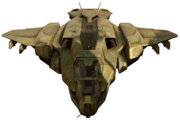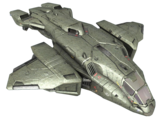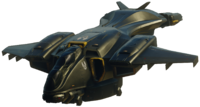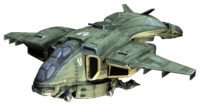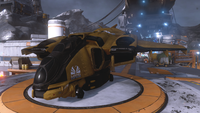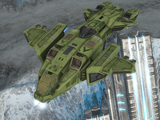Pelican
From Halopedia, the Halo wiki
"Pelican" is the name applied to a series of tactical aerospace lifters operated by the UNSC Air Force, the UNSC Marine Corps, the UNSC Navy, corporate entities and the civilian security forces.
Summary[edit]
The Pelican line entered service in 2392.[1][Note 1]
The air frame of the Pelican allows them to carry heavy objects underneath their tail booms. Common carry items include an M12 Warthog, M808 Scorpion tank, troop deployment pods or resupply canisters.
Pelicans receive serial numbers to be identified by during radio transmissions, particularly in combat situations. Each serial number consists of a letter from the Phonetic Alphabet followed by a number. Though a few Pelicans have this number inscribed on their cargo bays, most have no distinguishing mark on their exteriors.
Types[edit]
D75 Pelican[edit]
- D75 Pelican - A type of Pelican seen in 2526.[2]
- D75/r Pelican - A reconnaissance version of the D75.[2]
- D75/g Pelican - A version of the D75 equipped with a ground support package.[2][Note 2]
D77 Pelican[edit]
- D77 Pelican - The UNSC's standard dropship variant operated during the Insurrection and the Human-Covenant War.
- D77C Pelican - Paramilitary variant used by law enforcement in urban areas.[1]
- D77C-NMPD Pelican - The version of the D77C used by the New Mombasa Police Department.
- D77H-TCI Pelican - A better-armed variant of the D77 Pelican, featuring tandem pilot-seating configuration.
- G77S Gunship - A gunship variant of the D77 created by Isabel to fight the Banished.[3]
D78 Pelican[edit]
- D78 Pelican - A less common model used after the Covenant War, with improved avionics and thrusters[1][4]
D79 Pelican[edit]
- D79H Pelican - The UNSC's standard dropship as of 2557, replacing the aging D77 models.
- G79H Pelican - The dedicated gunship variant of the D79 Pelican.
- Corp Pelican - A corporate-branded D79 Pelican fielded by the Liang-Dortmund Corporation.
Individualized types[edit]
- ONI stealth type - A modification plan used by ONI to retrofit two individual Pelicans (Bogof and Tart-Cart) with numerous upgrades changing their sizes and mission capabilities.
Related vehicles[edit]
- D102 Owl - A stealth capable craft, physically resembling a Pelican.[5]
- Condor - Built on the frames of Pelicans, though are considerably larger; earning them the nicknames "Fat Pelican" or "SuperPelican".[6]
Gallery[edit]
A Pelican in Halo Wars.
Concept art of crashed Pelicans in Halo Infinite.
List of appearances[edit]
Notes[edit]
- ^ In a 2008 interview with Frank O'Connor and Robert McLees, Frank O'Connor and Robert McLees mention that the Pelican as a family of vehicles had been in service for 40-50 years. It is unknown if this in reference to a specific model and its subtypes or the entire "Pelican" line of ships.
- ^ Chapter 7 of Halo: Oblivion also refers to this type of Pelican as the D75/s. According a tweet by Troy Denning, D75/s was an early name for the vehicle, which was later replaced by D75/g at 343 Industries' recommendation. The use of the term D75/s in chapter 7 was a mistake that slipped through proofreading.
Sources[edit]
- ^ Jump up to: a b c Halo Waypoint: Pelican
- ^ Jump up to: a b c Halo: Oblivion, Chapter 6
- ^ Halo Waypoint: Canon Fodder - The Art of War(s)
- ^ Halo 4: The Essential Visual Guide, p. 112
- ^ Halo: Last Light, p. 320 (Google Play edition)
- ^ Halo Waypoint: Condor
| ||
| ||
| ||

